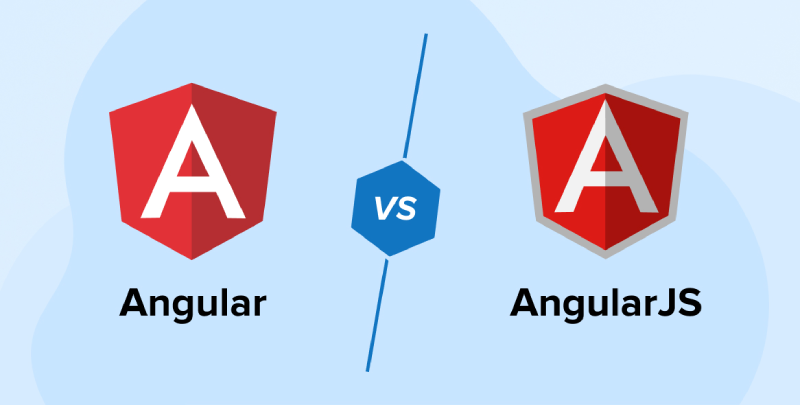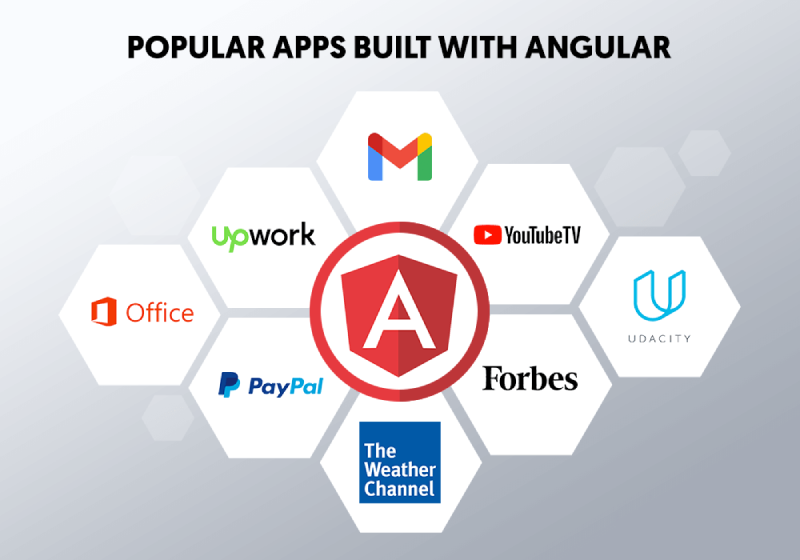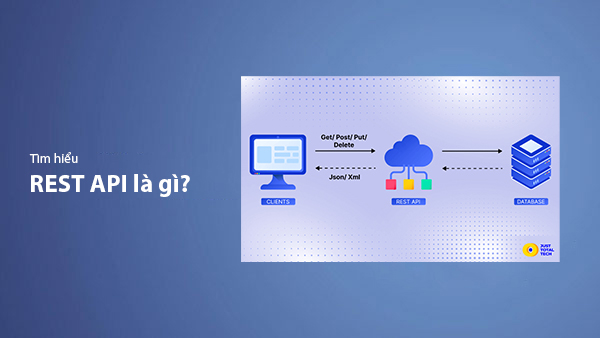What Is Angular? – Why It’s a Top Choice for Frontend Development?
- Published on

- What is Angular?
- Difference Between AngularJS and Angular
- How Does Angular Benefit Frontend Developers?
- Advantages and Disadvantages of Angular
- Advantages:
- Disadvantages:
- Summary Table
- Practical Applications of Angular
- Resources for Learning Angular
- How Front-End Developers in IT View the Future of Angular
- Conclusion
What is Angular?
Angular is an open-source web application development framework developed and maintained by Google, designed to help developers build modern, fast, and efficient web applications. Released in 2016, Angular utilizes TypeScript – a superset of JavaScript – which enhances code organization, enables early error detection, and supports object-oriented programming. Angular's standout feature is its Component-Based Architecture, which allows developers to break down the UI into independent, reusable, and maintainable modules.

The Angular Framework is not only limited to web development but also extends to mobile and desktop applications, thanks to its robust library support. Features like Two-Way Data Binding, Dependency Injection, and Directives make Angular an ideal tool for building high-performance, complex applications.
Specifically, Angular is designed to handle all aspects of the application lifecycle, from project configuration, data management, and UI optimization to testing. Thanks to these comprehensive features, Angular has become a top choice for large-scale projects that require stability and long-term maintenance.
Difference Between AngularJS and Angular
Although both AngularJS and Angular originate from the same Google project, they represent two generations of frameworks with significant advancements:
- Programming Language:
- AngularJS uses JavaScript, a widely used language but limited in terms of code organization and error control.
- Angular, starting from version 2, is built on TypeScript, which simplifies development with static typing and modern syntax support.
- Architecture:
- AngularJS adopts the MVC (Model-View-Controller) model, where data, business logic, and UI are managed independently.
- Angular employs a Component-Based Architecture, dividing the UI into reusable, testable, and independent components.
- Performance:
- AngularJS executes in the browser by compiling code directly, resulting in lower performance for complex applications.
- Angular improves speed with Ahead-of-Time (AOT) Compilation, compiling TypeScript into HTML and JavaScript before deployment to the browser.
- Mobile Support:
- AngularJS focuses primarily on web applications.
- Angular is designed to support both web and mobile applications through tools like Ionic Framework.
- Community and Documentation:
- Angular benefits from a larger community and extensive documentation. Updates are regularly released, ensuring long-term stability and compatibility.

Explore the list of the best frontend frameworks of 2024 to learn more about the top tools that suit your development needs.
- Summary Table
| Criteria | AngularJS | Angular |
|---|---|---|
| Programming Language | Uses JavaScript, with limitations in code organization and error control. | Uses TypeScript, which supports static typing and modern syntax. |
| Architecture | Follows the MVC (Model-View-Controller) model. | Utilizes a Component-Based Architecture, making components reusable and testable. |
| Performance | Executes directly in the browser, leading to lower performance for complex applications. | Enhances performance through Ahead-of-Time (AOT) Compilation. |
| Mobile Support | Focused on web application development. | Supports both web and mobile applications via tools like Ionic. |
| Community and Documentation | Smaller community with less frequently updated documentation. | Larger community with rich and regularly updated resources. |
These differences make it clear that Angular is not merely an upgraded version of AngularJS but a complete redesign to address the limitations of the earlier version and meet the growing demands of modern web application development.
How Does Angular Benefit Frontend Developers?
Angular offers numerous outstanding benefits that help Frontend Developers improve productivity and manage projects effectively:
-
Boosting Productivity:
Angular provides powerful tools like Angular CLI (Command Line Interface), enabling developers to quickly create projects, add components, manage modules, and perform testing with just a few simple commands. This significantly reduces the time spent on project setup and configuration. -
Code Reusability:
With its Component-Based Architecture, Angular allows the UI to be divided into small, reusable components that can be utilized in multiple parts of the application or across different projects. This not only saves time but also makes the codebase cleaner and easier to maintain. -
Efficient Data and State Management:
Angular comes with built-in tools for managing data, such as RxJS (Reactive Extensions for JavaScript) and Angular Services, which help handle asynchronous data, data streams, and application state seamlessly. Additionally, the Two-Way Data Binding feature synchronizes data between the user interface and business logic, minimizing errors and simplifying code. -
Testing Support:
Angular is designed with robust testing support. Tools like Jasmine and Karma are integrated, allowing developers to write and run unit tests or integration tests effortlessly, ensuring product quality. -
Large Community and Ecosystem:
With support from Google and a large developer community, Angular consistently provides new updates, extensive documentation, and numerous libraries, enabling developers to quickly find solutions to technical problems.
Thanks to these benefits, Angular not only optimizes the workflow of developers but also ensures that applications are built with high quality, meeting modern industry standards.
Advantages and Disadvantages of Angular
Advantages:
-
High Performance:
Angular uses Ahead-of-Time (AOT) Compilation, which compiles TypeScript into HTML and JavaScript before deployment to the browser, reducing load time and improving execution speed. -
Good Code Management:
With its Component-Based Architecture and TypeScript, Angular ensures a well-structured codebase that is easy to maintain and scale. -
Two-Way Data Binding:
This feature automatically synchronizes data between the user interface and application logic, reducing manual coding and potential errors. -
Integrated Security:
Angular provides security mechanisms like Sanitization to prevent XSS (Cross-Site Scripting) attacks and supports the development of secure applications. -
Large Community and Rich Documentation:
Backed by Google and an extensive developer community, Angular offers detailed official documentation and a variety of supportive libraries. -
Testing Support:
Angular integrates well with testing tools like Jasmine, Karma, and Protractor, making it easy to write and run tests to ensure application quality.
Disadvantages:
-
High Complexity:
Angular requires developers to understand many concepts such as Modules, Directives, Services, and RxJS, making it challenging for beginners. -
Performance for Small Applications:
For small or simple projects, Angular might be considered "too heavy" due to its complex structure and numerous unnecessary features. -
Large Bundle Size:
Even with optimization techniques like tree-shaking, Angular applications often have larger bundle sizes compared to frameworks like React or Vue.js. -
Steep Learning Curve:
Angular has a steep learning curve, requiring significant time and effort to master.
"If you're considering choosing between frameworks, learn more about ReactJS – another prominent framework with a completely different philosophy and approach to application development."
Summary Table
| Category | Details |
|---|---|
| Advantages |
|
| Disadvantages |
|
Despite some drawbacks, Angular remains an ideal choice for large and long-term projects that demand high performance and robust security.
Practical Applications of Angular
Angular is widely used in various fields due to its flexibility, scalability, and high performance. Below are some practical applications of Angular:
-
Enterprise Applications:
Angular is commonly used to build complex management systems such as ERP (Enterprise Resource Planning) or CRM (Customer Relationship Management). These applications require the ability to handle large datasets, integrate diverse modules, and provide an intuitive user interface. -
E-commerce Applications:
Major online shopping platforms like Shopify or other e-commerce websites integrate Angular to create interactive interfaces, manage shopping carts, process payments, and display products seamlessly. -
Educational and E-learning Applications:
Angular is a popular choice for e-learning platforms like Coursera or Learning Management Systems (LMS) due to its ability to build dynamic interfaces, customize easily, and manage content effectively. -
Mobile Applications with Ionic:
Angular, when combined with the Ionic Framework, is used to develop cross-platform mobile applications supporting iOS, Android, and Progressive Web Apps (PWAs). -
Social Media Applications:
Platforms like LinkedIn leverage Angular to manage user interactions and display dynamic content effectively. -
Administrative and Analytics Dashboards:
Angular is a top choice for building data analysis dashboards, offering real-time interaction and excellent integration with chart libraries like D3.js and Chart.js.

Thanks to its flexibility and strength, Angular meets the complex demands of various projects, from large-scale enterprises to personal platforms, enabling developers to build modern, optimized applications.
Resources for Learning Angular
Angular is a comprehensive framework that requires a solid knowledge base, but fortunately, there are many high-quality resources available to help you start and enhance your skills:
-
Official Angular Website (angular.io):
The best place to start, offering official documentation, step-by-step tutorials, and detailed examples from beginner to advanced levels. You can also find information about the latest updates. -
Angular University:
A learning platform focused on Angular, offering detailed courses from beginner to advanced, suitable for both newcomers and experienced developers. -
YouTube:
Channels like Academind, Traversy Media, and Net Ninja provide free Angular tutorials. These visual aids make learning easier and more practical with real-world examples. -
Online Courses:
Platforms like Udemy, Pluralsight, and Coursera host numerous Angular courses designed by industry experts. Popular courses include:- Angular - The Complete Guide on Udemy (by Academind).
- Getting Started with Angular on Pluralsight.
-
Books on Angular:
If you prefer reading printed materials, books like "Angular Up & Running" or "Pro Angular" are excellent learning resources. -
Communities and Forums:
- Stack Overflow: Thousands of questions and solutions related to Angular are shared by the developer community.
- Reddit: Subreddits like r/angular provide news, discussions, and support from Angular experts and users.
- Github: Explore open-source projects related to Angular to learn from real-world implementations.
-
Blogs and In-Depth Articles:
Blogs like Angular Blog, Medium, or Dev.to frequently publish in-depth articles, tips, and examples to help you grasp complex aspects of Angular.
Combine theoretical learning with practical projects. Building small projects to apply what you’ve learned immediately will deepen your understanding and proficiency in this framework.
How Front-End Developers in IT View the Future of Angular
Angular is highly regarded by Front-End Developers for its stability, robustness, and support from Google. Despite competition from frameworks like React and Vue.js, Angular retains unique features that secure its position:
-
Stability and Long-Term Support:
Angular’s backing by Google ensures regular updates, security support, and long-term stability. This makes Angular a top choice for large, long-term projects requiring sustainability. -
Suitable for Large Enterprise Projects:
With its Component-Based Architecture, strong data management capabilities, and built-in features, Angular is ideal for large-scale management systems where complex data processing and interactive user interfaces are required. -
Comprehensive Features:
Unlike other frameworks that require external libraries for integration, Angular provides complete functionality like routing, state management, form handling, and dependency injection, simplifying application development. -
Challenges and Opportunities:
Some new developers might find Angular challenging due to its steep learning curve. However, those who overcome this hurdle will possess a highly sought-after skill, especially in large companies. -
Popularity:
According to several technology surveys, while Angular may be less popular than React, it maintains a significant community and is widely used, especially in enterprise application development and large-scale platforms. -
The Future of Angular:
With a focus on performance improvement, enhanced developer experience, and support for mobile and Progressive Web Apps (PWAs), Angular is expected to grow robustly and maintain its importance in the Front-End Development field.
In summary, despite intense competition, Angular remains a significant player in the tech ecosystem. It is not only a powerful tool for developers but also a worthwhile investment for those aiming to build a long-term career in IT.
Conclusion
Angular is a powerful and comprehensive front-end framework, well-suited for building modern web applications, especially for projects requiring complexity and scalability. Supported by Google, an extensive developer community, and a rich ecosystem, Angular offers stability, high performance, and exceptional scalability.
Although learning and using Angular can be challenging, developers who master it gain a significant advantage in the job market, particularly in large enterprises. With continuous improvements and adaptability to new technological trends like Progressive Web Apps (PWAs) and Single Page Applications (SPAs), Angular remains a solid choice for both the present and future.
Whether you are a newcomer embarking on your Angular journey or an experienced developer, mastering this framework will enable you to grow your career in Front-End Development and contribute to building high-quality web applications that meet the evolving demands of the software industry.
Latest Posts

Lesson 26. How to Use break, continue, and return in Java | Learn Java Basics
A guide on how to use break, continue, and return statements in Java to control loops and program execution flow effectively.

Lesson 25. The do-while Loop in Java | Learn Basic Java
A detailed guide on the do-while loop in Java, including syntax, usage, examples, and comparison with the while loop.

Lesson 24. How to Convert Decimal to Binary in Java | Learn Basic Java
A guide on how to convert numbers from the decimal system to the binary system in Java using different methods, with illustrative examples.

Lesson 23. How to Use the While Loop in Java | Learn Java Basics
Learn how to use the while loop in Java with syntax, real-world examples, and practical applications in Java programming.
Related Posts

What is REST API? Complete A-Z Knowledge About REST API
REST API is one of the essential concepts that every backend developer needs to fully understand. This article provides comprehensive knowledge about REST API, including its definition, principles of operation, and how to build a standard RESTful API.

What is HATEOAS? How to Build APIs Using HATEOAS
Learn about HATEOAS, an important concept in API development, and how to build APIs using HATEOAS to improve interactivity and scalability.

What Is GraphQL? The Advantages of GraphQL Over REST API
Explore GraphQL, a modern API technology, and why it outperforms REST API in many web development scenarios.

What is XSS? Signs of Detection and Effective Prevention Methods
Learn about XSS, signs of detection, and effective prevention methods for XSS attacks in websites.

